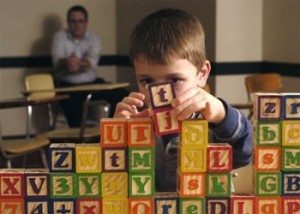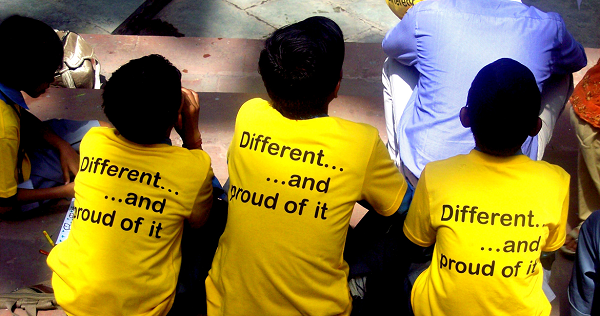The key for parents dealing with autistic children is to focus on the positives to bring out their innate abilities.
 by Kamini Lakhani | saiconnections01@gmail.com
by Kamini Lakhani | saiconnections01@gmail.com
Part 7 of the Autism Diaries – The only way we can save ourselves and those we love from being hurt.
Wednesday mornings are the best mornings of the week for me – because it is time for our weekly group class! We have a group of eight to nine mothers attending each week. I learn so much from this weekly interaction. I’m honoured to moderate this class and be a guide to all these wonderful people.
So on a recent Wednesday I threw open the discussion with one of my favourite quotes, “And that’s the thing about people who mean everything they say. They think everyone else does too.” (Khaled Hosseini, The Kite Runner).
Every participant had their own opinion. Most of us identified with the quote. At the same time, we’ve all found our way around this. We understand another’s perspective and over a period of time, have learned not to take this too seriously, or to let it affect us badly.
Blessed to deal with autism spectrum children
We share our genetic pool with our children. Due to a lack of neural connectivity and the brain being wired differently, do our kids who are on the Autism Spectrum experience extreme literal thinking? Since they experience difficulty with simultaneous processing and have problems with perspective taking, is this problem amplified for them? It is certainly a possibility!
Among these youngsters, there are no pretenses. You get what you see. You get unconditional love – a rare commodity these days. I feel privileged to catch glimpses of greatness on a day-to-day basis. In all the years that I have worked with them, I have felt protected and taken care of. If I am worried about something, one of the little ones will, of their own accord, come sit on my lap. Or one of the ‘big guys’ will walk into my office and put out a hand of blessing on my head!
Something happened just yesterday. I was feeling overwhelmed by a situation that engulfed me. This boy greeted me at the door, took me by the hand and walked around with me – as if to say,  “You’re not alone, I’m with you.” What else can one need in life?
“You’re not alone, I’m with you.” What else can one need in life?
I feel that it’s my life’s mission to create a safety net for all these wonderful people who have impacted my life in such a big way! How do I do this? I don’t have the abilities that they do, but I’m privileged to be able to understand them, to see the brilliant light in them.
The discussion moved to each mother talking about her child’s strengths. Surprise of surprises! Most of us felt that though we are aware of their strengths, we tend to focus on their weaknesses.
Focus on the strengths
For instance, one mother was constantly focussing on her son’s hyperactivity, rather than being appreciative of his love for life and curiosity that he so clearly displays. Another mom discovered that though her son was hugely skilled, she focussed on his ‘aggressive behaviours’. Yet somebody else was focused on her son’s problems related to visual perceptual skills rather than his ability to share his emotions so clearly. I am personally guilty of being over focussed on my son’s health issues rather than his tremendous artistic talent and ability!
There is a difference between being aware of what is lacking and focussing almost obsessively on it. I’m certainly not telling any parent to put on blinkers and stop looking at the deficits. What I am saying is this: Be aware of your child’s strengths, understand how your child learns. Focus on this, build the positives and support your child to overcome the deficits. But support your child by being respectful. Do not break the child’s spirit.
Here’s what one of my veteran moms, Sudha Ranganathan, has to say about this: “Acceptance is recognising their strengths and limitations and still expecting and supporting them to do better.”
Let me explain by using an example. Shraddha is a wonderful young girl, always smiling and happy, a willing learner and totally well versed and comfortable with kitchen skills. She has deficits with visual perceptual skills. Her mother feels that if Shraddha gets better with this, we could work on her reading and writing, and thereby give her an effective way to communicate.
 She has a valid point. But if we focus on just getting Shraddha to read and write the conventional way, we will in all probability, fail. Instead, if we focus on the positives – her good nature, her willingness to participate, enhanced gross and fine motor skills – we can make a positive difference to this lovely girl’s life. Plus, if we keep in mind the delayed processing that Shraddha displays and learn to guide her appropriately with this, could we not come up with a superior, customised plan to teach her to read and write?
She has a valid point. But if we focus on just getting Shraddha to read and write the conventional way, we will in all probability, fail. Instead, if we focus on the positives – her good nature, her willingness to participate, enhanced gross and fine motor skills – we can make a positive difference to this lovely girl’s life. Plus, if we keep in mind the delayed processing that Shraddha displays and learn to guide her appropriately with this, could we not come up with a superior, customised plan to teach her to read and write?
Isn’t this what respect is about? Work with their strengths. Use these to support them to overcome weaknesses.
For if you try to force a square peg into a round hole- you may end up damaging the peg! If you want to improve lives of families with children on the spectrum, or if you have any queries about autism and other learning conditions, feel free to email me at saiconnections01@gmail.com. I will be glad to help.
Kamini Lakhani is the founder of SAI Connections. She is a Behaviour Analyst, an RDI (Relationship Development Intervention) Consultant, Supervisor and Trainer responsible for RDI professional training in India and the Middle East. She is the mother of an adult on the Autism Spectrum. She is also a member of Forum for Autism.
Next: How motivation and resilience are connected to each other.
(Pictures courtesy www.jhsph.edu, www.matthewreardon.org)

One reply on “What is the true meaning of acceptance?”
Hi, my son is 9 on the autism spectrum. We did RDI with thank God with great success for 2 years. But then I’m not sure what happened we got busy and I stopped doing one to one activities with my son and now it’s like he lost everything he used to do. He wants to be prompted to do everything. I was homeschooling him from kindergarten and just this September he started school bc I felt we needed to try it for him. I loved doing RDI before I just don’t know how to get back into it when he wants to be prompted all the time.